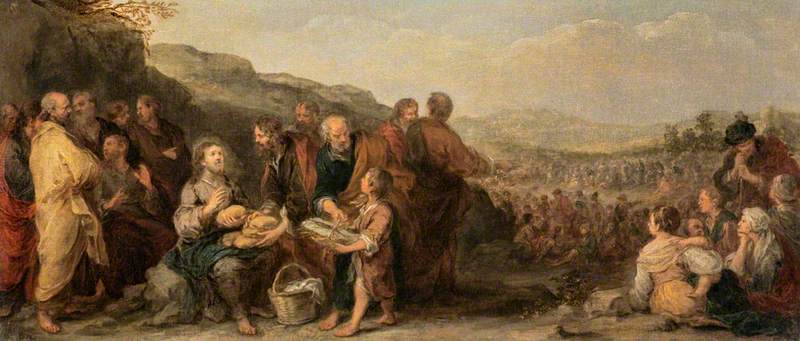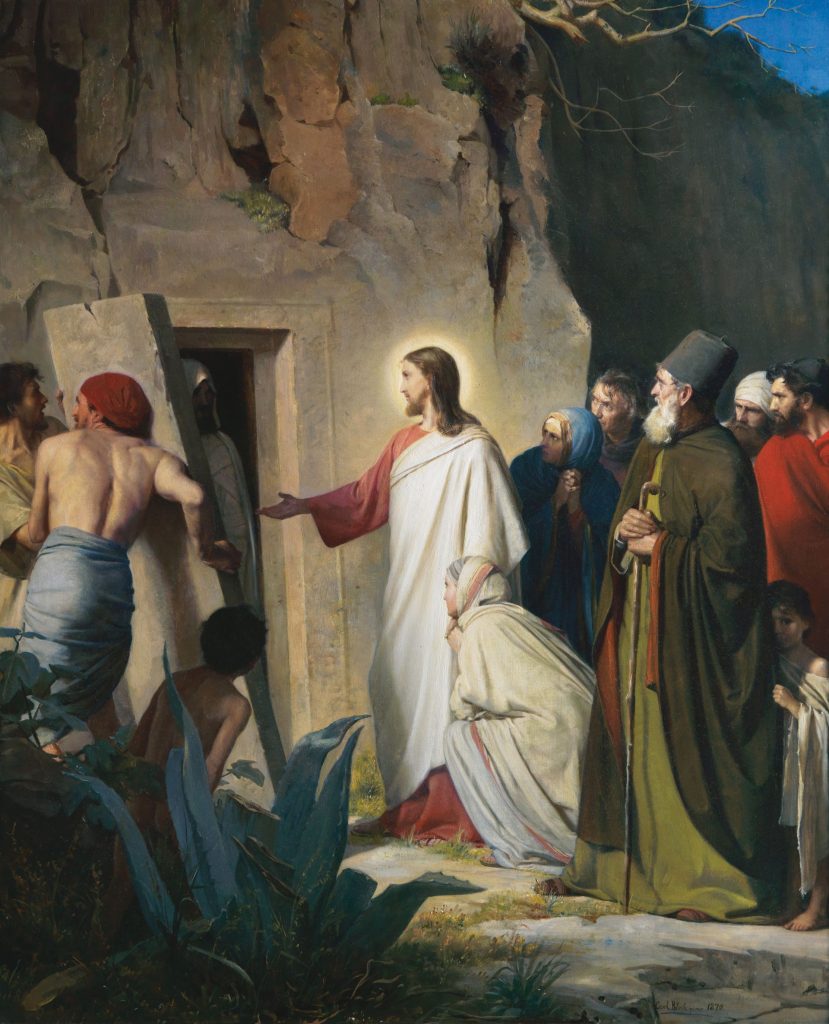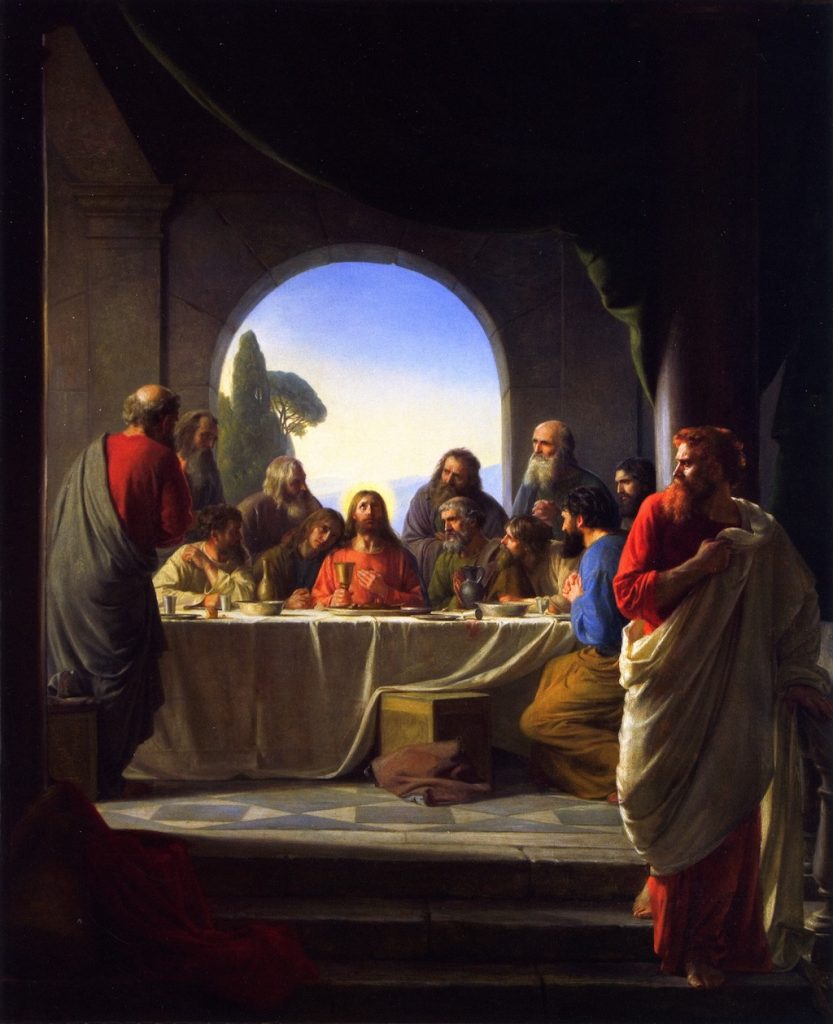I wrote this post several years ago around Thanksgiving time. It was published on another blog. Since the miracles mentioned will be studied in the coming weeks in Come, Follow Me, I felt it was a perfect time to repost my thoughts here.
This time of year when grateful hearts turn into giving hands, my scripture study focuses on thanksgiving and the commandment we are given to be grateful. Gratitude is not just a commandment from the Lord, “Thou shalt thank the Lord thy God in all things.” (D&C 59:7) It is a commandment with a promise, “And he who receiveth all things with thankfulness shall be made glorious; and the things of this earth shall be added unto him, even an hundred fold, yea, more.” (D&C 78:19) How is it that gratitude has the potential to make us glorious? To find out, I look to the example Jesus Christ set.
There are only three recorded occasions in the Bible where Jesus offers thanks or eucharisteo.1 Eucharisteo is the original Greek word used and means thanksgiving. ² In each instance Christ offers eucharisteo before a miracle is performed. Digging further into the etymology of eucharisteo and how it is used in the Bible one gains even greater insight into not only the miracles Christ performed, but how they each fit together to point us to Him. Eucharisteo comes from two root words. Charis meaning grace and chara meaning joy. These intertwine reminding us that it is through the atoning grace of Jesus Christ that our joy will be full. Looking at the miracles simultaneously provides deep meaning for our lives.

As Jesus was teaching by the Sea of Galilee, a great multitude had gathered bringing their lame, blind, and deaf to Him to be healed. Jesus had compassion on the crowd, recognizing they had nothing to eat. He made this observation to his apostles. In Matthew we read what followed next,
And his disciples say unto him, Whence should we have so much bread in the wilderness, as to fill so great a multitude?
And Jesus saith unto them, How many loaves have ye? And they said, Seven, and a few little fishes.
And he commanded the multitude to sit down on the ground.
And he took the seven loaves and the fishes, and gave thanks, and brake them, and gave to his disciples, and the disciples to the multitude.
And they did all eat, and were filled: and they took up of the broken meat that was left seven baskets full. (Matthew 15:32-37, emphasis added. See also Mark 8:6 and John 6:11)
While His apostles were focused on what was lacking, Jesus Christ gave thanks for what they already had. The miracle of feeding over 4,000, where bread was multiplied and hunger quelled, taught the lesson that Jesus is the Bread of Life. His compassion fills us. We experience joy.

A weeping Jesus stands outside a tomb in Bethany. Mary and Martha are gathered with others mourning the death of their beloved Lazarus. Jesus commands that the stone covering the tomb’s entrance be removed. Martha objects, saying, “Lord, by this time he stinketh: for he hath been dead four days”.
Jesus saith unto her, Said I not unto thee, that, if thou wouldest believe, thou shouldest see the glory of God?
Then they took away the stone from the place where the dead was laid. And Jesus lifted up his eyes, and said, Father, I thank thee that thou hast heard me.
And I knew that thou hearest me always: but because of the people which stand by I said it, that they may believe that thou hast sent me.
And when he thus had spoken, he cried with a loud voice, Lazarus, come forth.
And he that was dead came forth, bound hand and foot with grave clothes: and his face was bound about with a napkin. Jesus saith unto them, Loose him, and let him go. (John 11:40-44, emphasis added)
Imagine the joy of Mary and Martha! This miracle was particularly powerful, testifying that He truly is the way, the truth, and the life. Yes, Christ has power over physical death. We are also reminded of His power over spiritual death. We are each like Lazarus bound in the grave clothes of this world. We are freed, loosed from the bands of spiritual death as we heed His call to come forth. Again, His grace is sufficient.

At the last supper as Jesus sat with the apostles, He knew He would soon have to suffer for our sins and hang on the cross providing that miraculous atonement and yet, He still gave thanks,
And he took the cup, and gave thanks, and said, Take this, and divide it among yourselves: For I say unto you, I will not drink of the fruit of the vine, until the kingdom of God shall come. And he took bread, and gave thanks, and brake it, and gave unto them, saying, This is my body which is given for you: this do in remembrance of me. Likewise also the cup after supper, saying, This cup is the new testament in my blood, which is shed for you. (Luke 22:17-20, emphasis added)
Jesus offers thanksgiving before the very thing that will cause Him, “the greatest of all, to tremble because of pain, and to bleed at every pore, and to suffer both body and spirit.” (D&C 19:18) We know this presentation of the bread and wine (water) as the Sacrament. Other religions call it the Eucharist.
Eucharisteo. Thanksgiving.
Charis. Grace.
Chara. Joy.
Isn’t this what the infinite atonement does for us? Partaking of the sacrament should cause us to acknowledge with deep gratitude the grace that is offered through the atonement of Jesus Christ which brings us true joy.3
“Our most valuable worship experience . . . is the sacred ordinance of the sacrament, for it provides the opportunity to focus our minds and hearts upon the Savior and His sacrifice.” (David B. Haight) 4
Each miracle – the multiplying of the bread, the raising of the dead, and the agony of blood shed turns us to Jesus Christ, the Savior and Redeemer of the world. He makes all things possible! “There is none other name given under heaven save it be this Jesus Christ, of which I have spoken, whereby man can be saved.”5 It is through Christ we are made glorious. It is in Him our joy is full.6
- How has practicing gratitude changed you?
- How often do we give thanks before an experience we know will be hard and difficult for us?
- Have you ever expressed gratitude while in the midst of a trial?
References
1. One other instance of Jesus Christ saying thanks is given in Matt. 11:25 and Luke 10:21. In these verses thanks is translated from the Greek word exomologeo which means to acknowledge, profess, or praise.
2. See Strong’s Concordance of the Bible, G2168 – eucharisteo.
3. It is interesting to note the first reference of chara – joy in the New Testament points to Jesus Christ when the angel declares to the shepherds “Fear not: for, behold, I bring you good tidings of great joy, which shall be to all people.” (Luke 2:10)
4. David B. Haight, The Sacrament and the Sacrifice, Ensign April 2007.
5. See 2 Nephi 25:20
6. See Doctrine and Covenants 101:36.
 I’m Montserrat. I’m a farmer’s wife, mother of eleven children, and mega chocoholic. I am a member of The Church of Jesus Christ of Latter-day Saints. A Gospel Centered Home was created to help parents unleash the power of families by transforming their homes into a sanctuary of faith.
I’m Montserrat. I’m a farmer’s wife, mother of eleven children, and mega chocoholic. I am a member of The Church of Jesus Christ of Latter-day Saints. A Gospel Centered Home was created to help parents unleash the power of families by transforming their homes into a sanctuary of faith.
Leave a Reply